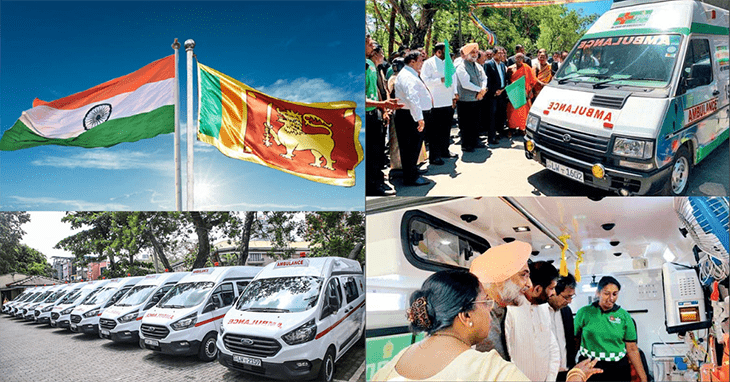

In an inspiring act of goodwill and regional solidarity, India transferred 88 ambulances to Sri Lanka in 2016, an initiative that has since evolved into a cornerstone of the island nation’s healthcare system. The move, originally described as a gesture of friendship between the two neighbors, has had a far-reaching impact that continues to save lives nearly a decade later. What began as a symbol of diplomatic generosity has now become a critical pillar in Sri Lanka’s emergency medical response network.
The formal handover was presided over by Indian Prime Minister Narendra Modi, during one of his landmark visits to Sri Lanka. With this transfer, Sri Lanka was able to launch its very first national emergency medical service—an equivalent to the 911 system in the United States or the 999 hotline in the United Kingdom. It marked a significant turning point for a country that had long relied on fragmented, regionally based emergency services. “Today, the fleet size of ambulances has grown to 322,” reported Sri Lanka’s Minister of Health and Media Nalinda Jayatissa in a communication to Prime Minister Modi last Saturday. “It is used to provide free emergency transportation services to the whole country day and night,” he added.
The statistics surrounding the program’s success are remarkable. According to national health records, around 2.44 million Sri Lankans have received care in these ambulances since the initiative’s inception. Emergencies ranging from cardiac arrests and strokes to serious road accidents are among the most common cases handled. Jayatissa emphasized that around 65% of these interventions occurred during the “golden hour”—the critical window immediately following a traumatic event when prompt medical treatment is most likely to prevent death or serious long-term consequences. “That is nearly 1.5 million lives saved up to now due to your generosity, and continues to save lives in Sri Lanka,” Jayatissa noted.
Sri Lanka’s healthcare success story is underpinned by strong human development fundamentals. Even before the arrival of the Indian-donated ambulances, Sri Lanka had distinguished itself in the South Asian region with impressive health metrics. In 2011, the World Economic Forum ranked the country in the top third of 142 countries surveyed for its health sector performance. Its Human Development Index (HDI) score of 0.750 placed it well ahead of neighboring nations in South Asia, reflecting high life expectancy, access to quality education, and a relatively high standard of living.
More recent assessments have only strengthened Sri Lanka’s reputation in healthcare excellence. The country has successfully eradicated several infectious diseases, reaching public health milestones ahead of many more developed economies. Life expectancy in Sri Lanka today stands at 75.5 years—approximately 10% higher than the global average—a testament to the strength of its healthcare infrastructure and proactive government policies. Beyond healthcare, the nation’s civic spirit is also globally recognized. Sri Lanka currently ranks fifth on the World Giving Index, an annual report that measures charitable behavior such as volunteering and donations among the populace.
The ambulance project stands as a shining example of what international cooperation can achieve when guided by mutual respect and common humanitarian values. India’s initial contribution, amplified over the years by Sri Lanka’s commitment to maintaining and expanding the service, has proven that investments in human welfare can yield returns that transcend politics and borders. The story of these ambulances is not merely one of equipment and logistics—it is a story of lives saved, families kept whole, and communities strengthened by the power of timely medical care.
As Sri Lanka continues to advance in its healthcare journey, the deep bonds forged through initiatives like the ambulance donation remind the world that genuine acts of goodwill leave legacies far greater than the sum of their parts. In an era often defined by division, the collaboration between India and Sri Lanka offers a powerful reminder that partnerships rooted in empathy can literally be the difference between life and death.
What are your thoughts? Please comment below and share this news!
True Activist / Report a typo







